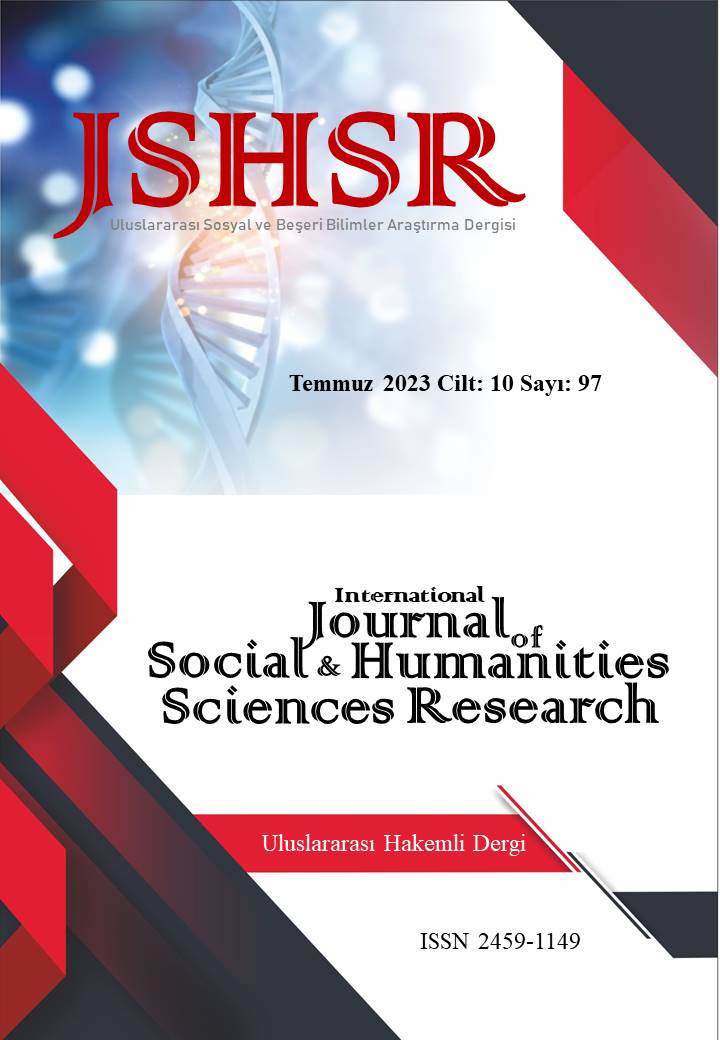Teachers' Perceptions of Digital Leadership
DOI:
https://doi.org/10.5281/zenodo.8209984Keywords:
Digital, leadership, teacher, school, digitization, transformation, hybridAbstract
This study, in which teachers' perceptions of digital leadership are investigated, is in a quantitative and scanning model. The sample of the research consists of teachers working in public schools in İzmir Çiğli district. Data were collected by reaching 265 teachers with an easily accessible sample selection. Frequency, mean, standard deviation and t-tests from parametric tests and analysis of variance were used in the analyses. It has been determined that teachers' digital leadership perceptions are at the highest and very high level, using digital applications to ensure that studies such as school magazines and newspapers are published in the digital environment and to receive the opinions of stakeholders (satisfaction surveys, etc.). In addition, it has been determined that a very high level of digital leadership characteristics are also exhibited in using digital tools to communicate with parents and benefiting from the digital transformation vision determined with the participation of all employees to ensure the digital transformation of the school. The lowest average was also high, and it was seen that it was about providing education to students about data security at school. High and very high levels of opinion were also reported for other items. It has been concluded that teachers evaluate digital leadership perceptions in all dimensions and in general at a very high level. It was concluded that teachers' perceptions of digital leadership did not differ significantly according to gender, marital status and technology use levels, but differed significantly according to education level, career level, age and level of work. The digital leadership perceptions of the teachers were found to be higher in favor of those with a bachelor's degree according to their education level. It was determined that the digital leadership perceptions of the teachers were higher in favor of those with the title of expert teacher and head teacher, according to the career level variable. According to the age variable, teachers' perceptions of digital leadership are higher in favor of older teachers. The digital leadership perceptions of the teachers were higher in favor of those working in secondary and high schools according to the level they work.
References
Akbaşlı, S. ve Diş, O. (2019). Öğretmen görüşleri doğrultusunda lider okul yöneticilerinin yeterlikleri. Uluslararası Liderlik Çalışmaları Dergisi: Kuram ve Uygulama, 2(2), 86-102.
Alkrdem, M. (2014). Technological leadership behavior of high school headteachers in Asir region, Saudi Arabia. Journal of International Education Research, 2(10), 95-100.
Asiltürk, A. (2020). Dijital dönüşüm bağlamında dijital liderlik ve dijital liderler. (ed.E. Karaçar ve Ö. Kıran). Sosyal Bilimlerde Güncel Konular ve Araştırmalar (s. 203-226), E-Kitap, Çizgi Kitapevi.
Aydın, K. (2022). Eğitim örgütlerinde dijital liderlik ve örgütsel bilgelik ilişkisi. [Yayınlanmamış Doktora Tezi], Anadolu Üniversitesi Eğitim Bilimleri Enstitüsü, Eskişehir.
Balyer, A. ve Öz, Ö. (2018). Academicians’ views on digital transformation in Education. International Online Journal of Education and Teaching (IOJET), 5(4), 809-830.
Carretero, S., Vuorikari, R. ve Punie, Y. (2017). The digital competence framework for citizens. https://publications.jrc.ec.europa.eu/repository/bitstream/JRC106281/webdigcomp2.1pdf_
Chhabra, A. (2020). Leading Through Uncertainty: 7 Chrateristics of Highly Succesful Digital Leaders. https://www.information-age.com/7-characteristics-highly-successful-digital-leaders-123491351/.
Çelebi, F. (2021). Dijital çağda lidercilik ve girişimcilik. İksad Yayınevi.
Çelen, A. İ. (2020). Dijital dönüşüm sürecinde yükselen bir değer: Dijital liderlik. In H. Karadal, M. N. Efe, A. M. Abubakar, & K. Karadal (Eds.), Proceedıngs e-book (pp. 449-461). Papers presented at International CEO Communication, Economics, Organization & Social Sciences Congress, Bosnia Herzegovina, Gorajde: Dilkur Akademi.
Gündüz, Y. ve Balyer, A. (2013). Gelecekte okul müdürlerinin gerçekleştirmeleri gereken roller. Anadolu Üniversitesi Sosyal Bilimler Dergisi, 13(3), 45-54.
Harris, J., L., Al-Bataineh, M., T. ve Al-Bataineh, A. (2016). One to one technology and its effect on student academic achievement and motivation. Contemporary Educational Technology, 7(4), 368-381.
International Society for Technology in Education. (2009). National educational technology standards for administrators. http://www.iste.org/Content/NavigationMenu/NETS/ForAdministrators/2009 Standards/NETS_for_Administrators_2009.htm
Karasar, N. (2012). Bilimsel araştırma yöntemi (22. baskı). Nobel Akademi Yayıncılık.
MEB. (2020). Dijital okuryazarlık kılavuzu. http://cdn.eba.gov.tr/kitap/digital/#p=5
Mert, G. (2021). Dijital dünyada yeni bir boyut: Dijital liderlik. Satın Alma Dergisi, 9(97), 50-51.
Öz, Ö. (2020). Dijital liderlik: Dijital dünyada okul lideri olmak. Uluslararası Liderlik Çalışmaları Dergisi: Kuram ve Uygulama, 3(1), 45-57.
Özmen, Ö. N., Eriş, E. D., & Özer, P. S. (2020). Dijital liderlik çalışmalarına bir bakış. Suleyman Demirel University Journal Of Faculty Of Economics & Administrative Sciences, 25(1), 57-69.
Parlak, B. (2017). Dijital çağda eğitim: olanaklar ve uygulamalar üzerine bir analiz. Süleyman Demirel Üniversitesi İktisadi ve İdari Bilimler Fakültesi Dergisi, 22, 1741-1759.
Petry, T. (2018). Digital Leadership. North, K., Maier, R., Haas, O. (Editörler), Knowledge management in digital change: New findings and practical changes içinde (s. 209-218). Cham: Springer International Publishing.
Sağlam, E. ve Uçar, R. (2022) The relationship between school administrators’ creative leadership qualities and school’s organizational intelligence levels, International Journal of Psychology and Educational Studies, 9(4), 1133-1147.
Sahyaja, C. ve Rao, S. (2018). New leadership in the digital eraa conceptual study on emotional dimensions in relation with intellectual dimensions, International Journal of Civil Engineering and Technology, 9 (1), 738-747.
Sheninger, E. (2014). Pillars of digital leadership. International Center for Leadership İn Education. [https://saanys.org/wp-content/uploads/2020/10/the-main-idea-Digital-Leadership-April-2020.pdf]
Sincar, M. ve Aslan, B. (2011). İlköğretim öğretmenlerinin okul yöneticilerinin teknoloji liderliği rollerine ilişkin görüşleri. Gaziantep Üniversitesi Sosyal Bilimler Dergisi, 10(1), 571 – 595.
Şişman, M. (2012). Öğretim liderliği. Pegem A.
Tabachnik, B. G. & Fidell, L.S. (2013). Using multivariate statistics (6e éd.). Pearson
Toduk Y. (2017). http://www.hurriyet.com.tr/ik-yeni-ekonomi/dijital-liderler-nasil-olmali-40492744
Toduk, Y., & Gande, S. (2016). Whats next in Turkey? A new leadership model for connected age. In Amrop Leadership Series, 1-41.
Yahşi, Ö. (2020). Okul yöneticilerinin teknoloji liderliği özyeterliklerinin incelenmesi: İzmir örneği. Academic Platform Journal of Education and Change, 3(2), 232-250.
Yıkılmaz, İ. ve Sürücü, L. (2021) Dijital Çağda Liderliğin Yeni Yüzü: Dijital Liderlik. İçinde, İ. Tarakçı, B. Göktaş (Ed.), Dijital Gelecek Dijital Dönüşüm-2, Efe Akademi, 301-317.
Downloads
Published
How to Cite
Issue
Section
License
Copyright (c) 2023 INTERNATIONAL JOURNAL OF SOCIAL HUMANITIES SCIENCES RESEARCH

This work is licensed under a Creative Commons Attribution 4.0 International License.


